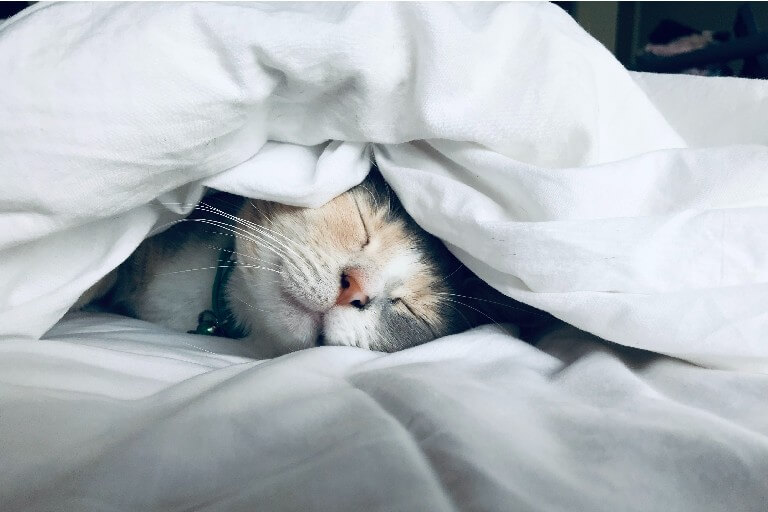Is it a Good Idea to Sleep with Your Cat?

The debate on whether it’s a good idea to sleep with your cat has been going on for years. While some argue that they couldn’t sleep a wink without their feline, others claim that it isn’t good for their health.
So, if you’re here because your cat insists on using you as a pillow, we’ll bring you both the good and the bad sides. Keep reading, because, when it comes to living with animals, it’s always good to be as well-informed as possible.
The good side to sleeping with your cat

The truth is that, in general, felines are the ones who take the initiative to sleep with their owners. Therefore, it’s important to keep in mind that this habit affects cats and humans alike. Let’s take a look at some of the benefits for both of you:
- It improves the relationship between you and your cat: physical contact is a direct and effective way to bond with your feline, especially in such a vulnerable state as sleep.
- Purring relaxes: Having your cat purring nearby is soothing and helps you fall asleep.
- They provide warmth: The average body temperature of cats is between 38-39ºC. On colder nights, their presence in bed is comforting.
- They help to start the day well: Waking up with them is always going to make us happy. The joint awakening is usually accompanied by a cuddling session that helps us to wake up quicker.
Disadvantages
Having read all of the above, you may think that sleeping with a cat is the perfect solution to your insomnia problems and that you’re going to create the best relationship ever with your cat. However, you must take into account that every cat, house, and human is different, and unpleasant situations may arise at any given time.
Therefore, in this section, we’ll tell you about some potential problems arising from this practice of sleeping with your cat, both for them and for you:
- If you should decide, at any point, that you no longer want to sleep with your cat, then you’ll create a stressful situation if you don’t make the transition properly. Your cat may feel that you’re pushing them out of their sleeping area for no apparent reason.
- More restless cats can give problems during the night: Keep in mind that you don’t have the same sleep cycle, and playing, jumping, and scratching will be a source of insomnia for you if they happen too often.
- More territorial felines may show aggressive behavior during the night to ensure that they maintain control over their sleeping area.
- If the cat has access to the outdoors, be aware that they could be carrying parasites or diseases that can be transmitted to humans. In addition, they tend to carry more dirt than those who don’t go outdoors.
- The presence of hairs, epithelia, and mites on bedding can trigger an allergic reaction at any time.
How to sleep with your cat: important tips

Now that you know the pros and cons of sleeping with a cat in the same bed, you may be wondering how to prevent these problems or improve your sleep quality. In fact, there are several measures you need to keep in mind if you’re going to share such an intimate area with your feline:
- Prevent your cat from going outdoors: There are many reasons why we recommend this. To start with, there’s a greater danger of contagion for them, either with pathogens from the environment or with diseases transmitted by other cats. This is a basic form of prevention.
- Brush your feline: With a regular brushing routine, you’ll prevent your cat from releasing too much hair into the environment and, therefore, onto the sheets. The frequency will depend on the type of coat.
- Clean your home thoroughly and regularly: It’s true that it’s impossible to keep your home 100% hair-free. However, you should keep rigorous hygiene in areas where you share time with your cat, such as the bed and the sofa.
- Use an anti-dust mite cover: These are usually available in pharmacies. These covers completely isolate the mattress, so that mites from the cat’s fur and skin can’t enter.
- Go for regular veterinary check-ups: The best way to prevent diseases in your cat (and in you, in the case of zoonoses) is to have their vaccination and deworming schedule up to date. Have regular check-ups of their general health.
As you can see, it can be a wonderful experience to sleep with your cat, and even a form of emotional support for both of you. However, you need to observe how things work out for you, and if it’s a comfortable and feasible practice. If not, it’s best to teach them to sleep in their own bed through positive reinforcement.
The debate on whether it’s a good idea to sleep with your cat has been going on for years. While some argue that they couldn’t sleep a wink without their feline, others claim that it isn’t good for their health.
So, if you’re here because your cat insists on using you as a pillow, we’ll bring you both the good and the bad sides. Keep reading, because, when it comes to living with animals, it’s always good to be as well-informed as possible.
The good side to sleeping with your cat

The truth is that, in general, felines are the ones who take the initiative to sleep with their owners. Therefore, it’s important to keep in mind that this habit affects cats and humans alike. Let’s take a look at some of the benefits for both of you:
- It improves the relationship between you and your cat: physical contact is a direct and effective way to bond with your feline, especially in such a vulnerable state as sleep.
- Purring relaxes: Having your cat purring nearby is soothing and helps you fall asleep.
- They provide warmth: The average body temperature of cats is between 38-39ºC. On colder nights, their presence in bed is comforting.
- They help to start the day well: Waking up with them is always going to make us happy. The joint awakening is usually accompanied by a cuddling session that helps us to wake up quicker.
Disadvantages
Having read all of the above, you may think that sleeping with a cat is the perfect solution to your insomnia problems and that you’re going to create the best relationship ever with your cat. However, you must take into account that every cat, house, and human is different, and unpleasant situations may arise at any given time.
Therefore, in this section, we’ll tell you about some potential problems arising from this practice of sleeping with your cat, both for them and for you:
- If you should decide, at any point, that you no longer want to sleep with your cat, then you’ll create a stressful situation if you don’t make the transition properly. Your cat may feel that you’re pushing them out of their sleeping area for no apparent reason.
- More restless cats can give problems during the night: Keep in mind that you don’t have the same sleep cycle, and playing, jumping, and scratching will be a source of insomnia for you if they happen too often.
- More territorial felines may show aggressive behavior during the night to ensure that they maintain control over their sleeping area.
- If the cat has access to the outdoors, be aware that they could be carrying parasites or diseases that can be transmitted to humans. In addition, they tend to carry more dirt than those who don’t go outdoors.
- The presence of hairs, epithelia, and mites on bedding can trigger an allergic reaction at any time.
How to sleep with your cat: important tips

Now that you know the pros and cons of sleeping with a cat in the same bed, you may be wondering how to prevent these problems or improve your sleep quality. In fact, there are several measures you need to keep in mind if you’re going to share such an intimate area with your feline:
- Prevent your cat from going outdoors: There are many reasons why we recommend this. To start with, there’s a greater danger of contagion for them, either with pathogens from the environment or with diseases transmitted by other cats. This is a basic form of prevention.
- Brush your feline: With a regular brushing routine, you’ll prevent your cat from releasing too much hair into the environment and, therefore, onto the sheets. The frequency will depend on the type of coat.
- Clean your home thoroughly and regularly: It’s true that it’s impossible to keep your home 100% hair-free. However, you should keep rigorous hygiene in areas where you share time with your cat, such as the bed and the sofa.
- Use an anti-dust mite cover: These are usually available in pharmacies. These covers completely isolate the mattress, so that mites from the cat’s fur and skin can’t enter.
- Go for regular veterinary check-ups: The best way to prevent diseases in your cat (and in you, in the case of zoonoses) is to have their vaccination and deworming schedule up to date. Have regular check-ups of their general health.
As you can see, it can be a wonderful experience to sleep with your cat, and even a form of emotional support for both of you. However, you need to observe how things work out for you, and if it’s a comfortable and feasible practice. If not, it’s best to teach them to sleep in their own bed through positive reinforcement.
All cited sources were thoroughly reviewed by our team to ensure their quality, reliability, currency, and validity. The bibliography of this article was considered reliable and of academic or scientific accuracy.
- Beck, A. M., & Katcher, A. H. (1996). Between pets and people: The importance of animal companionship. Purdue University Press.
- Worthman, C. M., & Melby, M. K. (2002). Toward a comparative developmental ecology of human sleep.
- Smith, B., Thompson, K., Clarkson, L., & Dawson, D. (2014). The Prevalence and implications of human–animal co-sleeping in an Australian sample. Anthrozoös, 27(4), 543-551.
- Plaut, M., Zimmerman, E. M., & Goldstein, R. A. (1996). Health hazards to humans associated with domesticated pets. Annual review of public health, 17(1), 221-245.
- Martinez-Caja, A. M., De Herdt, V., Slegers, M. J. E., & Moons, C. P. H. (2022). Pets and their owners during the first COVID-19 lockdown period: Perceived changes in routines and emotions–An exploratory study. Journal of Veterinary Behavior, 48, 86-91.
- Foreman-Worsley, R., Finka, L. R., Ward, S. J., & Farnworth, M. J. (2021). Indoors or outdoors? An international exploration of owner demographics and decision making associated with lifestyle of pet cats. Animals, 11(2), 253.
This text is provided for informational purposes only and does not replace consultation with a professional. If in doubt, consult your specialist.








